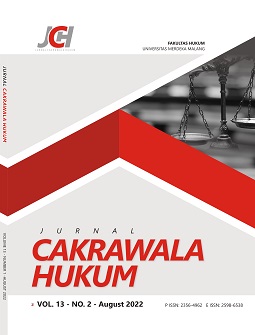Constitutionality of constitutional settlement of disputes for the election of local heads
DOI:
https://doi.org/10.26905/idjch.v13i2.6457Keywords:
Constitutionality, Dispute Results, Regional Head Election.Abstract
The authority to adjudicate disputes over the results of regional head elections continues to experience a shift in the judiciary. The delegation of authority to judge to the courts caused a polemic when the Pilkada was returned to the electoral regime, considering that the handover of auto power he the Special Courts Agency was based on the Constitutional Court's decision that the Regional Head Elections was a not General Election regime but the Regional Head Election regime. The purpose of this study is to describe the dynamics and the basis for the constitutionality of the authority to try it. The survey results stated that the judiciary's regulation on the settlement of ciary experienced three shifts, namely from the Supreme Court, the Constitutional Court, and the Special Courts Agency. However, the Special Courts Agency payment is unconstitutional because it is not a judicial institution that is explicitly and directly by the Constitution. The compensation of the amount by the Agency must be concretely normalized in the Republic of Indonesia Constitution so that the settlement process no longer moves, especially when the Regional Head Election is again designed to be returned to the General Election regime.
How to cite item:Â
Siboy, A. (2022). Constitutionality of constitutional settlement of disputes for the election of local heads. Jurnal Cakrawala Hukum, 13(2), 117-127. DOI:https://doi.org/10.26905/idjch.v13i2.6457.
References
Ibrahim, J. (2008). Teori & Metodologi Penelitian Hukum Normatif. Malang: Gentha Publishing.
Harun, R. (2016). Rekonstruksi Kewenangan Penyelesaian Perselisihan Hasil Pemilihan Umum. Jurnal Konstitusi, 13(1), 1-24. DOI: https://doi.org/10.31078/jk1311.
Hidayat, A. S., Helmi, M. I., & Alam, F. S. (2019). Impl Content the Content Justitie Principle of Justice in Local Leaders Election and General Election in Indonesia. International Journal of Engineering and Advanced Technology, 9(2), 2699-2703. DOI: 10.35940/ijeat.B2906.129219.
Kelliher, C., Isra, S., Daulay, Z., Tegnan, H., & Amsari, F. (2019). Unconstitutional authority of Indonesia's constitutional court: The resolution of pilkada result disputes. Election Law Journal: Rules, Politics, and Policy, 18(3), 297-308. DOI: http://doi.org/10.1089/elj.2018.0535.
Marijan, K. (2019). Sistem politik Indonesia: Konsolidasi demokrasi pasca orde baru. Jakarta: Kencana.
Sanjaya, W. (2015). Konstitusionalitas Pengaturan Dekonsentrasi Dalam Undang-Undang Nomor 23 Tahun 2014 tentang Pemerintahan Daerah. Padjadjaran Jurnal Ilmu Hukum (Journal of Law), 2(3), 581-597. DOI: 10.22304/pjih.v2n Suppose the Special Judicial Agency is not explicitly mentioned or there is no clarity on the position in the constitution. In that case, 3.a9.
Siboy, A., Sudarsono, J. H., & Fadli, M. (2018). Constitutionalism: Minimum Limit Of Votes Differences In The Settlement of Dispute On The Result of Simultant Regional Elections. Available at: https://www.researchgate.net/publication/331816439_Peer_ Reviewer_constitutionalism_of_minimum_limit_of_votes_ differences_in_the_settlement_of_dispute_on_the_result_ of_simultant_regional_elections.
Subiyanto, A. E. (2019). Hakim konstitusi: kekuasaan kehakiman dan pengisian jabatan. Jakarta: Rajawali Pers.
Supriyadi, S. (2017). Konsekwensi Presiden Tanpa Dukungan Mayoritas Di Parlemen. Jurnal Cakrawala Hukum, 5(2), 197-206. DOI: https://doi.org/10.26905/idjch.v5i2.700.
Taufik, F., Mohsays, F., & Ali, S. M. (2021). Ratio Legis Regulation Of The Establishment Of A Judicial Agency Specific Election Of Regional Head In Indonesia. RJOAS: Russian Journal of Agricultural and Socio-Economic Sciences. 3(111), March DOI: https://doi.org/10.18551/rjoas.03.14.
Downloads
Published
How to Cite
Issue
Section
License
Authors who publish in this journal agree to the following terms:
The copyright of the received article shall be assigned to the journal as the publisher of the journal. The intended copyright includes the right to publish the article in various forms (including reprints). The journal maintains the publishing rights to the published articles. Authors must agree to the copyright transfer agreement by checking the Copyright Notice column at the initial stage when submitting the article.





